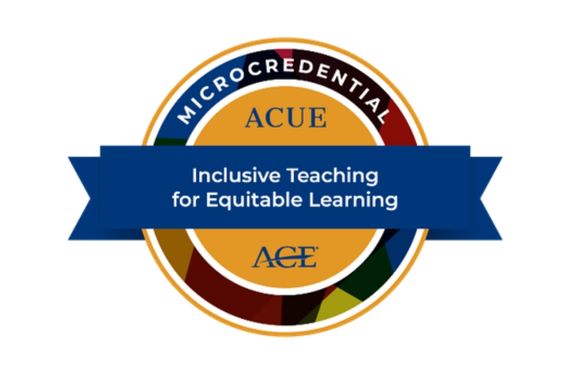 Regis College is pleased to announce that 28 faculty and staff members across the university earned a nationally recognized teaching credential, Inclusive Teaching for Equitable Learning (ITEL), offered by the Association of College and University Educators (ACUE).
Regis College is pleased to announce that 28 faculty and staff members across the university earned a nationally recognized teaching credential, Inclusive Teaching for Equitable Learning (ITEL), offered by the Association of College and University Educators (ACUE).
Following through on Regis’ Commitment to do Better, Regis faculty and staff participated in the three-month microcredential, learning about – and implementing – effective and equity-promoting teaching practices focused on developing students' sense of belonging, ensuring course materials are accessible, developing appreciation for diverse viewpoints, understanding how diversity aids in innovation, and setting expectations for productive dialogue.
Throughout, participants developed a deeper understanding of implicit bias, microaggressions, stereotype threat, and imposter phenomenon in an effort to continuously improve Regis’ ability to create an inclusive and equitable learning environment. Consistent with Regis’ mission, the five-module microcredential provides proven strategies to create a more equitable and just learning environment.
“We are grateful that our faculty and staff have demonstrated their commitment to inclusive excellence and student success through this rigorous training,” said Antoinette M. Hays, PhD, RN, president of Regis College. “We are equipped with the instructional skills shown to promote student motivation, learning, and persistence.”
“The ACUE Inclusive Teaching for Equitable Learning (ITEL) course profoundly impacted my thinking about teaching, the learning community, and course design,” said Donette C. Considine, PhD, LCSW, associate professor and director of the masters of social work program. “This course is a MUST for all faculty whether they have no teaching experience or decades of experience. Each week we were presented with valuable hands-on resources that we could immediately implement into our own teaching practices. I feel more prepared to provide an equitable learning environment for all of my students.”
Dr. Mary Erina Driscoll, provost and vice president of academic affairs at Regis, noted how important this certificate program was for students, faculty, and administrators. “Regis is proud that our faculty are so committed to the university’s mission, which recognizes the strengths and richness of our diverse student body,” said Dr. Driscoll. “It is critical that our faculty engage in inclusive teaching practices that ensure all students feel welcome and valued members of the Regis community in all our courses, be they in person or online.”
Faculty were recognized during a ceremony hosted by the Office of Academic Affairs, which partnered with ACUE to connect equitable teaching practices with Regis student success. The credentialed faculty members include 28 faculty and staff from online and on-campus departments and all four schools: Arts and Sciences, Nursing, Health Sciences, and Business and Communication.
"When first starting the ACUE course, I anticipated the content to be similar to other diversity training courses I have taken where I have often felt like a passive recipient of information. I was pleasantly mistaken as ACUE is more than 'training' or 'teaching,'” said Dr. Courtney James, DPT, adjunct professor of anatomy and physiology. “The way ACUE is designed invites individuals to be active participants challenging us to reflect on our current biases, course policies, and community building. From this reflection and collaborative online discussion, we were able to learn more about ourselves and others. This learning encouraged us to implement real change in our classrooms."
Faculty will continue to learn about pedagogy and receive career-long support through ACUE’s Community of Professional Practice, which provides access to member forums, expert webinars, bi-weekly newsletters, and regular opportunities with leading scholars in college instruction.
“We are thrilled to offer continuing support to Regis faculty and staff to sustain their use of evidence-based teaching practices,” said Ericka T. Hollis, PhD, assistant provost for academic innovation and faculty development. “This professional development offering aligns with the Regis mission and the impact on student outcomes will be remarkable.”


